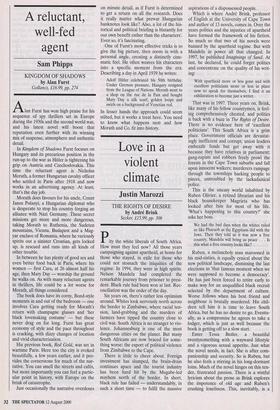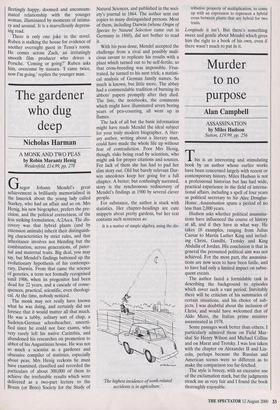Love in a violent climate
Justin Marozzi
THE RIGHTS OF DESIRE by Andre Brink Secker, £15.99, pp. 306 Pity the white liberals of South Africa. How must they feel now? All those years campaigning against apartheid, at home for those who stayed, in exile for those who could not stomach the iniquities of the regime. In 1994, they were in high spirits. Nelson Mandela had completed the remarkable journey from prisoner to presi- dent. Black rule had been won at last. Rec- onciliation was the order of the day.
Six years on, there's rather less optimism around. Whites look nervously north across the border to Zimbabwe, where racial ten- sion, land-grabbing and the murders of farmers have tipped the country close to civil war. South Africa is no stranger to vio- lence. Johannesburg is one of the most dangerous cities on the planet. But many South Africans are now braced for some- thing worse: the export of political violence from Zimbabwe to the Cape.
There is little to cheer about. Foreign investment has slumped, the brain-drain continues apace and the tourist industry has been hard hit by the Mugabe-led mayhem north of the border. In short, black rule has failed — understandably, in such a short time — to fulfil the massive aspirations of a dispossessed people.
Which is where Andre Brink, professor of English at the University of Cape Town and author of 13 novels, comes in. Over the years politics and the injustice of apartheid have formed the framework of his fiction. So much so that two of his novels were banned by the apartheid regime. But with Mandela in power all that changed. In 1997, he published Imaginings of Sand. At last, he declared, he could forget politics and concentrate on the quality of his writ- ing:
With apartheid more or less gone and with excellent politicians more or less in place now to speak for themselves, I find it an exhilaration to become just a writer.
That was in 1997. Three years on, Brink, like many of his fellow countrymen, is feel- ing comprehensively cheated, and politics is back with a buzz in The Rights of Desire. There is no evidence here of 'excellent politicians'. This South Africa is a grim place. Government officials are devastat- ingly inefficient and corrupt; union leaders embezzle funds but get away with it because they have relatives in parliament; gang-rapists and robbers freely prowl the forests in the Cape Town suburbs and fall• upon innocent walkers; murderers rampage through the townships hacking people to pieces, untroubled by the lackadaisical police.
This is the uneasy world inhabited by Ruben Olivier, a retired librarian and his black housekeeper Magrieta who has looked after him for most of his life. 'What's happening to this country?' she asks her boss.
We had the bad days when the whites ruled us like Pharaoh as the Egyptians did with the Jews. Then they told us it was now a free country, Mandela will bring us peace . . . Is this what a free country looks like?
Ruben, a melancholy man marooned in his mid-sixties, is equally cynical about the new political landscape, dismissing the last elections as 'that famous moment when we were supposed to become a democracy'. He has just been forced to retire early to make way for an unqualified black recruit selected by the department of culture. Worse follows when his best friend and neighbour is brutally murdered. His chil- dren tell him it is time to leave South Africa, but he has no desire to go. Eventu- ally, as a compromise he agrees to take a lodger, which is just as well because the book is getting off to a slow start.
Enter Tessa Butler, a beautiful twentysomething with a wayward lifestyle and a vigorous sexual appetite. Just what the novel needs, in fact. She is after com- panionship and security. So is Ruben, but he also feels a stirring in his long-dormant loins. Much of the novel hinges on this ten- der, frustrated passion. There is a wistful lyricism about the prose as Brink explores the impotence of old age and Ruben's crushing loneliness. This, inevitably, is a fleetingly happy, doomed and unconsum- mated relationship with the younger woman, illuminated by moments of intima- cy and arousal. It is a marvellously depress- ing read.
There is only one joke in the novel. Ruben is stalking the house for evidence of another overnight guest in Tessa's room. He comes across Zach, an irritatingly smooth film producer who drives a Porsche. 'Coming or going?' Ruben asks him, overcome by nausea. 'I came twice, now I'm going,' replies the younger man.



























































 Previous page
Previous page